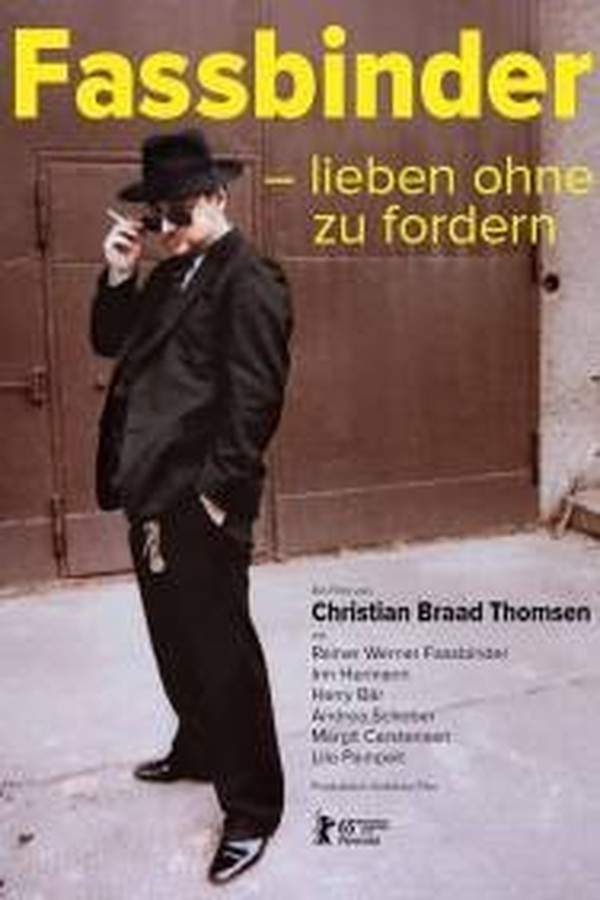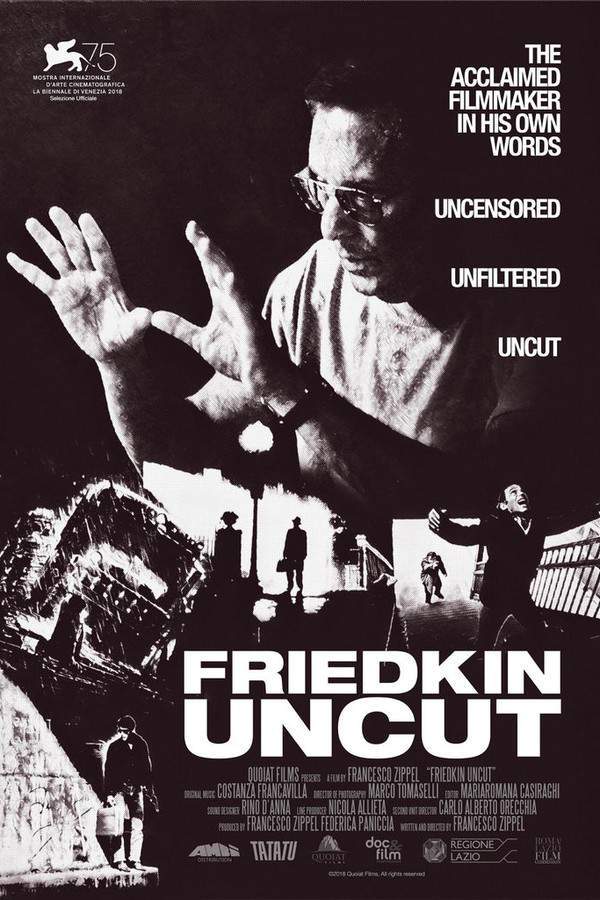
Fassbinder: To Love Without Demands Plot Summary
Read the complete plot summary and ending explained for Fassbinder: To Love Without Demands (2016). From turning points to emotional moments, uncover what really happened and why it matters.
Danish film director Christian Braad Thomsen found a deep friendship with renowned filmmaker Rainer Werner Fassbinder (1945-82), which began when they met at the Berlinale in 1969, where Fassbinder presented his debut film, Love is Colder Than Death. This documentary offers a unique glimpse into their relationship, featuring extensive interviews recorded in the 1970s that have remained unpublished until now. The emotional weight of the film is further enhanced by a poignant tape recording made shortly after Fassbinder’s untimely passing, which captures his mother, Lilo Pempeit, reflecting on his remarkable upbringing amidst the ruins of post-war Germany.
Additionally, the documentary includes new insights from actress Irm Hermann, who was among the first to recognize Fassbinder’s talent. Their friendship blossomed during a time when he was virtually unknown but held extravagant aspirations of working in Hollywood. Irm was a steadfast ally, nurturing his ambitious dreams. The film also features actor and producer Harry Bär, who recounts his last conversation with Fassbinder mere hours prior to his death, as they envisioned a new film project inspired by Joachim Witt’s song, Ich bin das Glück dieser Erde.
One of the more intimate narratives comes from Andrea Schober, who portrayed child roles in Fassbinder’s early works. Their bond was deeply emotional, as both sought fill the voids in their lives—Fassbinder yearning for a paternal connection, while Andrea sought a father figure. Each segment of the documentary is beautifully interwoven with Thomsen’s personal memories that celebrate his extraordinary friendship with Fassbinder.
Fassbinder stands out as one of the most prolific directors in cinema history, remarkable for having produced an astounding 60 films in just 14 years for both theaters and television. Initially emerging as an avant-garde filmmaker, he ultimately achieved global acclaim without compromising his vision. His work serves as a powerful visual representation of 20th-century German history, capturing the tumultuous transition from the Weimar Republic to the societal upheavals of the 1970s. A defining aspect of his films is the profound exploration of how historical events shape individual lives.
In this portrait, Thomsen delves into Fassbinder’s creativity, seeking to comprehend how his distinctive childhood influenced his artistic expression. Growing up with numerous surrogate parents, who were primarily refugees, he often found himself alone as these figures came and went. This isolation led Fassbinder to spend more time in cinemas than in schools. In front of Thomsen’s camera, he candidly discusses various facets of his life, including his fascination with post-war Hollywood, psychoanalysis, love, marriage, parenthood, and the madness of existence. The sentiment encapsulated in the title of his debut film, Love is Colder than Death, resonates throughout his body of work, ultimately revealing a love that transcends mortality among those drawn to him.
Through this compelling documentary, Christian Braad Thomsen strives to unravel the complex contradictions that defined Fassbinder, reflecting on a film interview conducted just hours before his passing, where he shared a thought-provoking insight: > “To be complete, you need to double yourself.”
Fassbinder: To Love Without Demands Timeline
Follow the complete movie timeline of Fassbinder: To Love Without Demands (2016) with every major event in chronological order. Great for understanding complex plots and story progression.
Meeting at Berlinale 1969
Christian Braad Thomsen meets Rainer Werner Fassbinder when Fassbinder showcases his debut film, 'Love is colder than death', at the Berlinale film festival in 1969. This encounter marks the beginning of a deep friendship between the director and the future icon of German cinema.
Last Encounter
Braad Thomsen and Fassbinder share their final meeting three weeks before Fassbinder's untimely death. This poignant moment underscores the importance of their friendship and the impact Fassbinder had on Thomsen's life and work.
Recording with Lilo Pempeit
Following Fassbinder's death, Christian Braad Thomsen records a conversation with Fassbinder's mother, Lilo Pempeit. Through her memories, she recounts Fassbinder's unusual childhood experiences growing up in post-war Germany, shedding light on the artist's formative years.
Irm Hermann's Memories
The film presents new interviews with actress Irm Hermann, who was among the first to recognize Fassbinder's talent before he gained public acclaim. Her support played a crucial role in Fassbinder's journey as he pursued grand dreams of making Hollywood films.
Harry Bär's Final Conversations
Actor and producer Harry Bär shares his recollections, including the last conversation he had with Fassbinder just hours before his passing. They discussed plans for a new film based on Joachim Witt's song 'Ich bin das Glück dieser Erde', revealing Fassbinder's unfulfilled ambitions.
Andrea Schober's Perspective
Andrea Schober, who starred as a child in Fassbinder's early films, offers her insights during an interview. Their bond was rooted in mutual yearning – Schober for a father figure and Fassbinder for a child – illuminating the emotional depth of their relationship.
Fassbinder's Artistic Journey
Fassbinder emerges as one of the most prolific filmmakers in history, creating 60 films for cinema and television in just 14 years. His ability to reach a wide audience while remaining true to his avant-garde roots is a central theme of the documentary.
Reflecting on German History
Fassbinder's work is recognized as a visual interpretation of 20th-century German history, addressing significant events from the Weimar Republic's demise to the terrorism of the 1970s. His films uniquely explore how historical narratives impact individual lives.
Understanding Creativity
Through the documentary, Christian Braad Thomsen seeks to unravel the complexities of Fassbinder's creativity, tracing it back to his extraordinary childhood. The interplay of his upbringing and the relationships he formed heavily influenced his artistic vision.
Fassbinder's Love Story
The film articulates Fassbinder's internal struggles with love, marriage, and madness, as he candidly discusses his feelings in front of Thomsen’s camera. His first film's title serves as an ironic reflection of his life and the deep connections formed with those around him.
Final Thoughts
Just hours before his death, Fassbinder articulates a profound insight during an interview, stating, 'To be complete, you need to double yourself.' This reflective statement encapsulates the complexities of his life and art, highlighting the profound contradictions he navigated.
Compiling the Documentary
The documentary weaves together interviews, personal memories, and archival footage to form a nuanced portrait of Fassbinder. This multifaceted approach provides viewers with a deeper understanding of both the artist and the man behind the legend.
Legacy in Cinema
Fassbinder's legacy as a filmmaker is solidified as an avant-garde pioneer who continuously pushed boundaries. His commitment to presenting authentic narratives about the human experience leaves an enduring impact on cinema and filmmakers worldwide.
Fassbinder: To Love Without Demands Characters
Explore all characters from Fassbinder: To Love Without Demands (2016). Get detailed profiles with their roles, arcs, and key relationships explained.
Rainer Werner Fassbinder
Fassbinder is portrayed as a complex individual whose life was marked by contradictions and intense emotions. Known as a prolific filmmaker, he was both celebrated and scrutinized for his radical approach to cinema and personal relationships. His search for connection and understanding is a central focus of the documentary, providing insight into his creative genius.
Christian Braad Thomsen
As the close friend and documentarian, Christian Braad Thomsen offers a deeply personal perspective on Fassbinder's life and legacy. His role as the interviewer allows for intimate revelations about Fassbinder's thoughts and experiences. Thomsen's reflections provide a bridge between Fassbinder's work and the human emotions that drove it.
Irm Hermann
Irm Hermann is depicted as an essential figure in Fassbinder's early life, providing unwavering support during his rise to fame. Her connection to Fassbinder underscores the theme of loyalty and belief in one's dreams, as she was among the first to recognize his talent. Their friendship reflects the deep personal bonds that influenced his creative journey.
Andrea Schober
Andrea Schober is portrayed as a child actor who formed a significant bond with Fassbinder during her early career. Their relationship highlights themes of longing and parental figures, as both experienced a search for connection. Schober's memories provide insight into Fassbinder's nurturing side and his influence on young talent.
Fassbinder: To Love Without Demands Settings
Learn where and when Fassbinder: To Love Without Demands (2016) takes place. Explore the film’s settings, era, and how they shape the narrative.
Time period
1970s
The documentary is set during the 1970s, a significant decade characterized by artistic exploration and cultural shifts in post-war Germany. This era saw a burgeoning film industry with directors like Fassbinder pushing boundaries, while also reflecting the social tensions of the time. It was a period of vast change, where societal norms were being challenged and redefined.
Location
Germany, München
The film takes place primarily in Germany, particularly in München, which is known for its vibrant cultural scene and historical significance in film and art. As a backdrop to Fassbinder's life and work, Germany epitomizes the changes and upheavals of the 20th century. The urban landscape of München serves as a critical space for artistic expression and experimentation.
Fassbinder: To Love Without Demands Themes
Discover the main themes in Fassbinder: To Love Without Demands (2016). Analyze the deeper meanings, emotional layers, and social commentary behind the film.
💔
Love & Loss
A central theme in the documentary is the exploration of love and loss, particularly how these emotions shaped Fassbinder's relationships and creative expression. His intense personal connections, both familial and platonic, are examined through the lens of his childhood experiences and friendships. These themes are reflected not only in his films but also in the poignant memories shared by those close to him.
🎭
Identity
The theme of identity is paramount in understanding Fassbinder's work and life. The documentary delves into his search for self amid the complexities of his upbringing and the various roles he played throughout his career. It highlights how his artistic identity was influenced by historical events and personal struggles, ultimately leading to his unique storytelling.
Movies with Similar Twists and Themes
Uncover films that echo the narrative beats, emotional arcs, or dramatic twists of the one you're exploring. These recommendations are handpicked based on story depth, thematic resonance, and spoiler-worthy moments — perfect for fans who crave more of the same intrigue.
Featured on this page

What's After the Movie?
Not sure whether to stay after the credits? Find out!
Explore Our Movie Platform
New Movie Releases (2025)
Famous Movie Actors
Top Film Production Studios
Movie Plot Summaries & Endings
Major Movie Awards & Winners
Best Concert Films & Music Documentaries
© 2025 What's After the Movie. All rights reserved.






